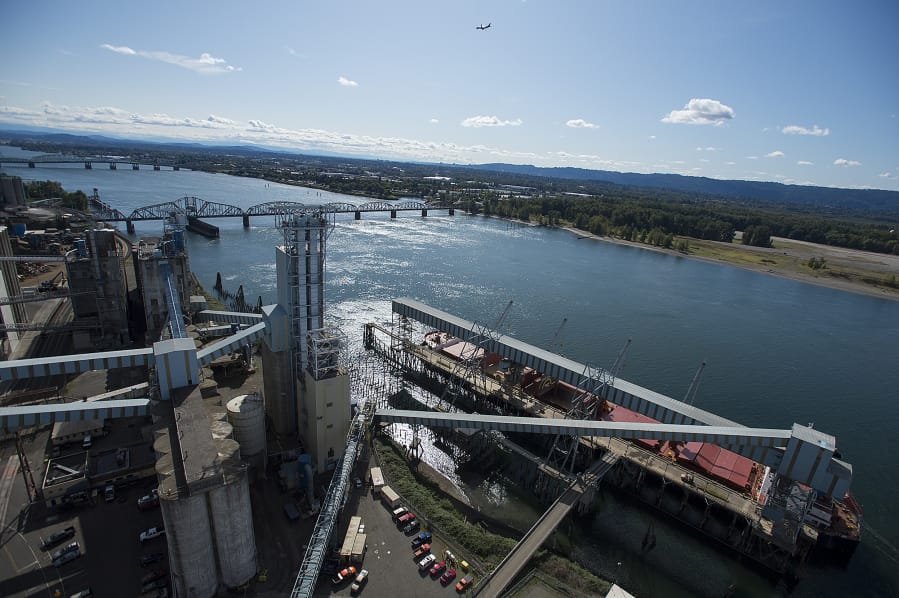The Port of Vancouver closed its administrative offices but continues to operate amid COVID-19 pandemic. Most its 60 staffers are working remotely, and all of the port’s terminals are operational.
“We’re continuing to see cargo moving across our docks, which is great,” said Ryan Hart, the port’s chief external affairs officer.
Still, he said, the outbreak has taken a toll: The port’s bulk commodity exports so far this year are down about 45 percent compared with this time last year.
That decrease can’t be attributed solely to the coronavirus, he said — a strong U.S. dollar was impacting export traffic before the outbreak began, and other global agriculture areas have been able to deliver products at more competitive prices in recent months.
Exports
United Grain Corp., one of the port’s biggest tenants, has implemented social distancing measures and work-from-home policies wherever possible, but is otherwise continuing to operate normally, according to CEO Augusto Bassanini.
There hasn’t been any impact to the company’s suppliers, he said — grain trains are still making regular deliveries and barge shipments recently resumed following a 20-day closure of the Columbia River’s lock and dam system. The closure was a regular maintenance event scheduled months in advance, he said, and not related to COVID-19.
“Things are going OK at the moment,” he said.
Global shipping hasn’t been significantly impacted, Bassanini said, and demand for wheat exports remains strong. At the moment, he said, United Grain is still feeling a greater impact from the trade dispute with China.
Bassanini said he thinks there could be a spike in demand for wheat in the future based on the rate at which bread and other wheat-based products have been flying off grocery store shelves in recent weeks, but it would take time for that impact to ripple back up the supply chain to United Grain.
“What we ship today is something that was purchased 60, 90 days ago,” he said.
Imports
The port is primarily export-driven, but it also serves as an import destination, most notably for Subaru vehicles and wind turbine components. That side of the business appears to have avoided any impacts so far, Hart said.
This year is still on track to be a record-breaking one for wind turbine imports at the port, and there hasn’t been any significant gap in the incoming stream of Subaru vehicles despite the impact of the virus in Japan.
If anything, Hart said, the more pressing concern is the U.S. market: Car sales are dropping as state and municipal governments impose stay-at-home orders and other social restrictions aimed at slowing the spread of the virus. The port has begun to prepare for how to manage and store a potential oversupply of Subaru vehicles.
There have been a number of recent headlines about multiple cruise ships dealing with coronavirus infections among their passengers and crew, but Bassanini and Hart said the cargo shipping industry hasn’t seen the same kind of impacts.
That’s likely due in part to the small crews and long voyages of cargo ships, Bassanini said — crews will spend 20 or more days traveling to their destinations, so there’s little risk of an infection remaining undetected by the time they arrive.
“That’s kind of a natural quarantine, so to speak,” he said.
Under U.S. law, vessels arriving at U.S. ports are required to report any deaths or illnesses during the previous 15 days to the Centers for Disease Control and Prevention, Hart added.
Other port business
Over at the port-owned Terminal 1 site, the WareHouse ’23 restaurant and event space has closed due to statewide restrictions on restaurant dining room operations. Owner Mark Matthias is continuing delivery service at the nearby Beaches Restaurant, which he also owns.
The port plans to redevelop the mostly vacant Terminal 1 into a new riverside destination with a hotel, multiple office or residential buildings and a new public marketplace at the site of the old Red Lion at the Quay hotel.
So far, only one of those projects is actually underway: Construction of the future AC Hotel by Marriott in partnership with Vancouver-based Vesta Hospitality. The port recently completed ground stabilization work at the site, Hart said, leaving Vesta free to begin construction of the actual building.
The port canceled its March 24 board of commissioners meeting, but plans to hold its next regular meeting on April 14 as scheduled. Hart said the agency is still figuring out whether that meeting will be held via conference call, video chat or some other means.
The ports of Ridgefield and Camas-Washougal have both also closed their administrative offices to the public, and canceled board meetings for the rest of March, but are otherwise continuing most of their normal operations, according to their websites.




